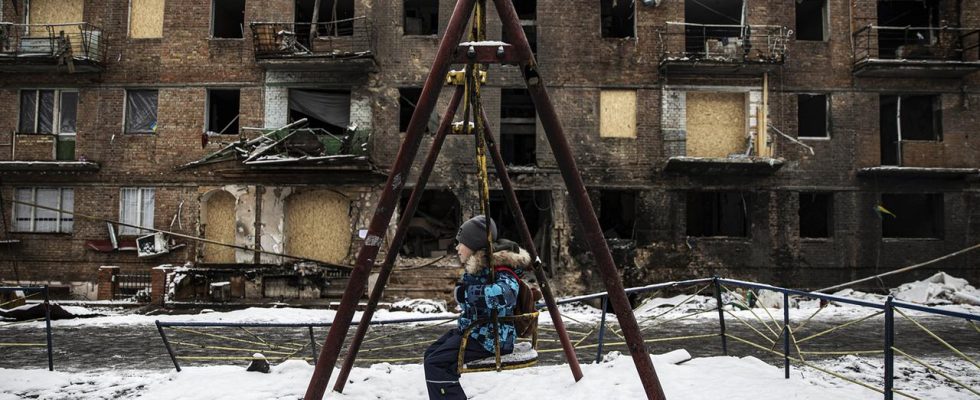The war that changed Ukraine began two years ago: tens of thousands died and millions fled. The feeling of togetherness is great, but exhaustion and mistrust are growing.
The journalists in the Kramatorsk hotel are woken up by two loud explosions. It’s February 24, 2022. There’s a hustle and bustle. Television teams set up their tripods and bright lamps on the terrace in front of the entrance, reporters in helmets and protective vests shout excited words into the cameras. The Russian war of aggression has begun.
A bus rolls slowly in the background. People drive to work.
It should be a few hours before the first lines at ATMs began to form. Until the extent of the Russian attack on the entire Ukraine became clear to everyone in the country.
More than four million refugees in the EU
Two years later, the functioning of the Ukrainian state depends on foreign financial aid. According to Ukrainian figures, almost five million people are on the run within the country, and more than four million are said to be in the countries of the European Union.
Ukraine does not officially announce how many soldiers lost their lives. According to American estimates there are around 70,000.
After the failed summer offensive by the Ukrainian armed forces, people are exhausted. Some hope for the father to return from captivity. Others on their brother’s return from the front. Parents are looking for their children who were abducted to Russia. They all hope for an early end to the war, which is probably a long way off.
Mined fields, blocked ports
Ukraine is a big country. Big enough to be able to suppress the war that has been simmering in eastern Ukraine for years from the reality of our lives – at least for a while. “The war had to come to us first so that we understood what the people of Donbass went through,” says a former farmer in Mykolaiv, southern Ukraine. It is summer 2022. The Russian troops have destroyed his farm and his equipment. The farmer went into the army.
The fields in the south of Ukraine are mined and most of the Ukrainian ports are blocked by Russia. The fact that grain can now be exported again via the Black Sea is one of the few bright spots for Ukraine. Without having any significant military power at sea, Ukraine managed to push back the Russian Black Sea Fleet. The Oryx website counts at least 20 destroyed Russian ships and submarines.
Hundreds of cultural assets destroyed
The war casts a shadow over people’s lives, even hundreds of kilometers from the front. He changed Ukraine forever. In previous years there was room for compromises, says Anastasia Pavlenko, spokeswoman for the “Lessia Ukrajinka” theater in Kiev. “But as of February 24, 2022, this room no longer exists.”
The cultural landscape in Ukraine is both threatened and strengthened by the war. According to Ukrainian information, hundreds of cultural objects were destroyed by Russian attacks. Before their withdrawal in autumn 2022, the Russian soldiers robbed the art museum in Kherson. Museums and libraries are worried about their collections.
At the same time, Ukrainian culture is flourishing. The renowned “Lessia Ukrajinka” theater gave up its designation as “Theater of Russian Drama” and banned the Russian language from its stages. Ukrainian pop and rap songs are playing on the radio, and stand-up comedians are making jokes in Ukrainian in the bars.
“There is a rift in society”
It is often said in Ukraine these days that war makes good people better and bad people worse. Over the past two years, the Russian war of aggression has turned strangers into friends and friends into strangers. In the trenches, soldiers describe a sense of togetherness similar to that of a family. Many are prepared to die for comrades they have only known for a few weeks.
But mistrust is spreading in the areas occupied by Russia. It was not uncommon for employees of the Ukrainian police and secret service to defect to the Russian occupiers. While critical citizens disappeared into the Russian torture chambers, it was often their neighbors who betrayed them for a little money or humanitarian aid. Today, Ukraine is persecuting collaborators in the newly liberated areas, and hundreds of criminal cases for high treason have been initiated.
“There is a rift in society,” says a local journalist from Izjum. The city in the Kharkiv region was under Russian occupation for six months. Many who endured the occupation and are now suspected by returnees of having worked with the Russian troops feel misunderstood.
“Many collaborators are walking around freely on the streets,” says the local journalist. And the mayor of the city also says he cannot trust the population. Mayor Marchenko fled from the Russian troops and is therefore considered a traitor by many who stayed. It takes time to restore trust among each other, he says.
“How many more should die – and for what?”
Despite the failed summer offensive, according to surveys, a majority of the population still believes in the victory of the Ukrainian troops. But Hanna Bondar wants her husband back. He has been deployed non-stop at the front for two years. “How many more should die – and for what?” she asks. “Nobody can live in these mined areas for decades.”
After two years of war, the people of Ukraine are exhausted. Brutal battles for militarily insignificant towns such as Maryinka, Bakhmut and Avdiivka have cost the lives of thousands of Russians and Ukrainians.
Russian ruler Vladimir Putin emphasizes that he has not yet achieved his war goal.
Andrea Beer, ARD Kiev, tagesschau, February 24, 2024 6:23 a.m

